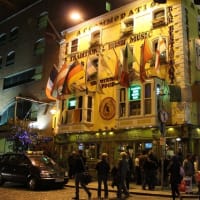2016年2月4日(Thu.) 立春を迎えました。日差しは暖かさを感じさせるものですが、空気はまだ冷たいですね。 昨日のドイツからの情報です。大晦日に大量の性犯罪・窃盗事件等が発生したケルンで、事件の再発に警戒をしながらも、190年以上続く伝統のカーニバルは開催されると言う内容です。(ニュースソース: DW-DE )
<原文の一部>
A kiss for your tie? Why Carnival kicks off with gender power games
Women take charge of men on the Thursday before Carnival, cut off their ties and give them a kiss. It's a tradition that hails from an era when women's rights were non-existent, but takes on extra significance this year.
(この文の意味は、後述の内容によって理解できるものです。)カーニバルを前にした木曜日(2月4日)、女性たちは主導権を取り、彼等(男性、または、夫)のネクタイを切ったり、彼等にキスをします。女性に権限がなかったころの時代から続くこの伝統は、今年は特別な意義があります。

*
It's a kind of unofficial holiday in the Rhineland region of Germany. The party starts at 11:11 am on the dot, and the pubs and streets burst with costumed revelers, alcohol and kitschy folk music known as "Schlager."
Maintaining your personal space is not exactly an option; close bodily contact with strangers is just as much a part of Carnival as music and beer. People link arms and sway to the Schlager, or do the "Stippeföttche," a traditional dance that involves rubbing rear ends together. Strangers "bützen" (smooch) and touch each other up.
But now, since the attacks on women on New Year's Eve, erotic innuendos among strangers have taken on a new connotation for many women. Incidences of sexual harassment occurred in many cities that night, but the situation was particularly severe in Cologne - which is also the epicenter of Car
(抜粋)このカーニバルの日は、ドイツ・ラインランド地方の非公式な休日のようなものです。見知らぬ人と触れ合うことは、音楽とビールと同じような祭りの要素になっています。しかし、大晦日の事件依頼、特にケルンではヒドイ状況だったので、心配する向きも多いようです。

*
Police beef up security for Carnival
Recently, the city on the Rhine River introduced its security policies for Carnival, which takes place from Thursday, February 4 though Tuesday, February 9. Cologne has promised more than twice as many police officers as in previous years.
The police, not only in Cologne but also in neighboring Bonn and Dusseldorf, have promised to keep a close eye on the situation - especially when it comes to incidents of sexual harassment and men who won't take no for an answer.
Since asylum-seekers were among those suspected of sexual harassment on New Year's Eve, the cities in the Rhineland have also said they will inform residents of nearby refugee accommodations about the region's Carnival traditions with flyers in seven languages.
(抜粋)カーニバルの期間中、この地方の警察は前年の倍の人員体制で警戒するそうです。また、難民居住地域に対しても、7ヶ国語のチラシを用意して注意喚起しているそうです。
*
It all started with laundry women
Weiberfastnacht - the Thursday before Carnival Monday and the official start of the Carnival weekend - is a tradition that dates back hundreds of years.
In the Middle Ages, upper-class woman were allowed to throw their manners out the window on this day, which was dubbed "the drinking day for dear women." In the 18th century, some convents even recognized the anything-goes tradition and the nuns were permitted to feast, gamble and dance until the wee hours of the morning.
In the 19th century, a group of washerwoman in Beuel near Bonn, around 30 kilometers south of Cologne, laid the foundation for the present-day Weiberfastnacht celebrations.
Back then, the washerwomen had to work 16 hours a day - not only for the high-society men who could afford it, but they also had to scrub their own husbands' dirty laundry so that they could go to Carnival parties in nearby Cologne in clean shirts. Their wives had to stay at home to work and tend to the children.
(抜粋)そもそもこのカーニバルの由来が説明されていますが、このケルンから南約30kmのところにあるボン(旧西ドイツ首都)の東に隣接するボイエルと言う街から起こったことのようです。

*
Storm the City Hall, chop off the ties
In 1824, the washerwomen had finally had enough. They ditched their work and met in a pub to complain about their husbands. Obviously, they weren't just sipping tea and coffee. They founded the "Beuel Ladies' Committee" and proceeded to storm the City Hall in Beuel, claiming authority for a day. The tradition stuck and Bonn-Beuel became an important Carnival hub.
Word of what the women in Beuel had done spread quickly throughout the Rhineland and City Halls were stormed in many other cities and villages as well.
As a symbol of depowering the men, the women started chopping off their ties, which they collected like trophies. Of course, since the tradition is all in good fun, the men don't go away empty-handed, but get a "Bützchen" - a smooch - in return. In this ritual, it's the woman who chooses who she's willing to kiss.
(抜粋)1824年、女性(洗濯婦)の権限が軽視されていたことに我慢できなくなった人達が組織(ボイエル婦人会のような)を作り、その動きは周辺都市にも広がったそうです。そして、この運動を強調する行動の一つとして男性人のネクタイを切ること、それはトロフィーを集めるような行為でもあったわけです。また、キスしたい相手も選ぶというものです。

*
Women won't give up their Carnival traditions
Despite the negative events of New Year's Eve, the tie-cutting, Bützchen-giving tradition is something many women in the Rhineland don't want to miss out on.
"We don't want our Carnival fun to be taken away from us," Nina Probst from the "Old Beuel Ladies' Committee from 1824" told DW. "In over 190 years of Carnival tradition in Beuel, there have been times in which women have learned to deal with difficult situations."
While Weiberfastnacht participants will have to rely on the stocked-up security measures, a girls' high school in Cologne is going one step further and closing their doors on Thursday. The school is located in close proximity to the central train station where the attacks occurred on New Year's Eve and doesn't want its students to have to travel to and from the campus through the crowds of not-so-sober revelers. The pupils aren't disappointed - that gives them the opportunity to join in the festivities.
"For us, Carnival is a happy, colorful celebration together," said Nina Probst. "That's why we're appealing to everyone to watch out for each other so that we can peacefully celebrate together."
(抜粋)ケルンでの大晦日事件にも関わらず、ラインランド地方の女性はこの伝統行事を放棄しませんでした。1824年から続き、190年を超える伝統行事は、女性にとって難しい状況を克服するための重要な時間(機会)でもあるから・・・と言います。
また、ケルンの中央駅(事件のあった場所に近い)近くにある女子高は休校となったのですが、催しものに参加できる機会にもなったことで失望はしていないと伝えています。
最後に、全ての人がお互いに平和的に祝い合うことができる場だ・・・と、カーニバルの意義を強調しています。
(以下の写真は、昨年以前のものと思われます。)











***
大晦日のケルン等での性犯罪事件がもたらした影響は大きいものがあります。メルケルも考えを軌道修正するキッカケにもなったようです。しかし、このケルンで開かれる伝統の行事は、正に、女性が作り上げたカーニバルでもあるので、尚更、「休止・中止」は選択肢には入らなかったのでしょう。
ただし、カーニバルのピークは次週月曜日(2月8日)らしいので、まだ予断は禁物・・・と言ったところでしょう。楽しい・意義あるカーニバルになることを私も祈ろうと思います。
ケルンやボン、そして、発祥の地でもあるボイエルの位置関係を下図で示します。2013年に訪問した懐かしい地名が多く含まれています。

出典: Google Earth
*** 下の写真は、記事内容とは関係ありません。(ドイツ国旗ではありますが・・・)

***
<原文の一部>
A kiss for your tie? Why Carnival kicks off with gender power games
Women take charge of men on the Thursday before Carnival, cut off their ties and give them a kiss. It's a tradition that hails from an era when women's rights were non-existent, but takes on extra significance this year.
(この文の意味は、後述の内容によって理解できるものです。)カーニバルを前にした木曜日(2月4日)、女性たちは主導権を取り、彼等(男性、または、夫)のネクタイを切ったり、彼等にキスをします。女性に権限がなかったころの時代から続くこの伝統は、今年は特別な意義があります。

*
It's a kind of unofficial holiday in the Rhineland region of Germany. The party starts at 11:11 am on the dot, and the pubs and streets burst with costumed revelers, alcohol and kitschy folk music known as "Schlager."
Maintaining your personal space is not exactly an option; close bodily contact with strangers is just as much a part of Carnival as music and beer. People link arms and sway to the Schlager, or do the "Stippeföttche," a traditional dance that involves rubbing rear ends together. Strangers "bützen" (smooch) and touch each other up.
But now, since the attacks on women on New Year's Eve, erotic innuendos among strangers have taken on a new connotation for many women. Incidences of sexual harassment occurred in many cities that night, but the situation was particularly severe in Cologne - which is also the epicenter of Car
(抜粋)このカーニバルの日は、ドイツ・ラインランド地方の非公式な休日のようなものです。見知らぬ人と触れ合うことは、音楽とビールと同じような祭りの要素になっています。しかし、大晦日の事件依頼、特にケルンではヒドイ状況だったので、心配する向きも多いようです。

*
Police beef up security for Carnival
Recently, the city on the Rhine River introduced its security policies for Carnival, which takes place from Thursday, February 4 though Tuesday, February 9. Cologne has promised more than twice as many police officers as in previous years.
The police, not only in Cologne but also in neighboring Bonn and Dusseldorf, have promised to keep a close eye on the situation - especially when it comes to incidents of sexual harassment and men who won't take no for an answer.
Since asylum-seekers were among those suspected of sexual harassment on New Year's Eve, the cities in the Rhineland have also said they will inform residents of nearby refugee accommodations about the region's Carnival traditions with flyers in seven languages.
(抜粋)カーニバルの期間中、この地方の警察は前年の倍の人員体制で警戒するそうです。また、難民居住地域に対しても、7ヶ国語のチラシを用意して注意喚起しているそうです。
*
It all started with laundry women
Weiberfastnacht - the Thursday before Carnival Monday and the official start of the Carnival weekend - is a tradition that dates back hundreds of years.
In the Middle Ages, upper-class woman were allowed to throw their manners out the window on this day, which was dubbed "the drinking day for dear women." In the 18th century, some convents even recognized the anything-goes tradition and the nuns were permitted to feast, gamble and dance until the wee hours of the morning.
In the 19th century, a group of washerwoman in Beuel near Bonn, around 30 kilometers south of Cologne, laid the foundation for the present-day Weiberfastnacht celebrations.
Back then, the washerwomen had to work 16 hours a day - not only for the high-society men who could afford it, but they also had to scrub their own husbands' dirty laundry so that they could go to Carnival parties in nearby Cologne in clean shirts. Their wives had to stay at home to work and tend to the children.
(抜粋)そもそもこのカーニバルの由来が説明されていますが、このケルンから南約30kmのところにあるボン(旧西ドイツ首都)の東に隣接するボイエルと言う街から起こったことのようです。

*
Storm the City Hall, chop off the ties
In 1824, the washerwomen had finally had enough. They ditched their work and met in a pub to complain about their husbands. Obviously, they weren't just sipping tea and coffee. They founded the "Beuel Ladies' Committee" and proceeded to storm the City Hall in Beuel, claiming authority for a day. The tradition stuck and Bonn-Beuel became an important Carnival hub.
Word of what the women in Beuel had done spread quickly throughout the Rhineland and City Halls were stormed in many other cities and villages as well.
As a symbol of depowering the men, the women started chopping off their ties, which they collected like trophies. Of course, since the tradition is all in good fun, the men don't go away empty-handed, but get a "Bützchen" - a smooch - in return. In this ritual, it's the woman who chooses who she's willing to kiss.
(抜粋)1824年、女性(洗濯婦)の権限が軽視されていたことに我慢できなくなった人達が組織(ボイエル婦人会のような)を作り、その動きは周辺都市にも広がったそうです。そして、この運動を強調する行動の一つとして男性人のネクタイを切ること、それはトロフィーを集めるような行為でもあったわけです。また、キスしたい相手も選ぶというものです。

*
Women won't give up their Carnival traditions
Despite the negative events of New Year's Eve, the tie-cutting, Bützchen-giving tradition is something many women in the Rhineland don't want to miss out on.
"We don't want our Carnival fun to be taken away from us," Nina Probst from the "Old Beuel Ladies' Committee from 1824" told DW. "In over 190 years of Carnival tradition in Beuel, there have been times in which women have learned to deal with difficult situations."
While Weiberfastnacht participants will have to rely on the stocked-up security measures, a girls' high school in Cologne is going one step further and closing their doors on Thursday. The school is located in close proximity to the central train station where the attacks occurred on New Year's Eve and doesn't want its students to have to travel to and from the campus through the crowds of not-so-sober revelers. The pupils aren't disappointed - that gives them the opportunity to join in the festivities.
"For us, Carnival is a happy, colorful celebration together," said Nina Probst. "That's why we're appealing to everyone to watch out for each other so that we can peacefully celebrate together."
(抜粋)ケルンでの大晦日事件にも関わらず、ラインランド地方の女性はこの伝統行事を放棄しませんでした。1824年から続き、190年を超える伝統行事は、女性にとって難しい状況を克服するための重要な時間(機会)でもあるから・・・と言います。
また、ケルンの中央駅(事件のあった場所に近い)近くにある女子高は休校となったのですが、催しものに参加できる機会にもなったことで失望はしていないと伝えています。
最後に、全ての人がお互いに平和的に祝い合うことができる場だ・・・と、カーニバルの意義を強調しています。
(以下の写真は、昨年以前のものと思われます。)











***
大晦日のケルン等での性犯罪事件がもたらした影響は大きいものがあります。メルケルも考えを軌道修正するキッカケにもなったようです。しかし、このケルンで開かれる伝統の行事は、正に、女性が作り上げたカーニバルでもあるので、尚更、「休止・中止」は選択肢には入らなかったのでしょう。
ただし、カーニバルのピークは次週月曜日(2月8日)らしいので、まだ予断は禁物・・・と言ったところでしょう。楽しい・意義あるカーニバルになることを私も祈ろうと思います。
ケルンやボン、そして、発祥の地でもあるボイエルの位置関係を下図で示します。2013年に訪問した懐かしい地名が多く含まれています。

出典: Google Earth
*** 下の写真は、記事内容とは関係ありません。(ドイツ国旗ではありますが・・・)

***




















※コメント投稿者のブログIDはブログ作成者のみに通知されます